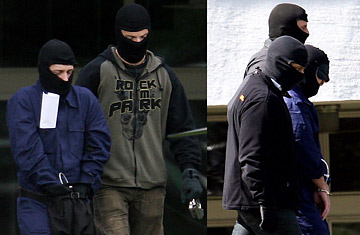
September 4, 2007: Terror suspects being brought to a helicopter after their presentation at the Federal Court of Justice in Karlsruhe, southern Germany.
In Sept. 2007, German police foiled what they say promised to be one of Europe's most devastating terror plots — bomb attacks on "an unimaginable scale" in several major cities. Eighteen months later, on April 22, four young men — three Germans and one Turkish national — are going on trial in Dusseldorf, charged with conspiring to commit murder, plotting to launch explosive attacks and membership of a terrorist organization, the Islamic Jihad Union (IJU). With over 200 witnesses, the trial is scheduled to last up to two years.
Prosecutors say the three Germans, Fritz Martin Gelowicz, 29, Daniel Martin Schneider, 23, and Atilla Selek, 24, and the one Turkish national, Adem Yilmaz, 30, were planning a series of car bombings in Germany that could have been deadlier than the attacks in London and Madrid. And according to prosecutors, the men had specific targets in mind: U.S. military bases including Ramstein, and Germany's biggest airport in Frankfurt, as well as discos, pubs and restaurants. So far, the suspects have remained silent, so their answer to these charges is not yet known. (See pictures of a Jihadist's journey.)
The men were arrested in a raid on Sept. 4, 2007, when German police commandos stormed their rented house in the village of Medebach-Oberschledorn, in the central region of Sauerland. At the time of the arrests, police say, the suspects were almost ready to strike and had turned their house into a bomb factory. The authorities found dozens of detonators and barrels of hydrogen peroxide, a chemical used in hair bleach which, when mixed with other materials, can be used to make explosives.
"This is probably the biggest terrorist trial in Germany this year," Ulrich Egger, spokesman for the Higher Regional Court in Dusseldorf, tells TIME. "The defendants are accused of planning a huge attack using explosives which would have been equivalent to 400 kilos (880 lbs) of TNT."
Prosecutors say the suspects trained at terrorist camps on the border of Afghanistan and Pakistan run by the IJU. After returning to Germany, the men allegedly started drawing up their plans, forming a domestic cell of the IJU known as the Sauerland Group.
The men had been under surveillance by U.S. and German intelligence agents for months. The authorities claim that at the end of 2006, two of the suspects had been spying on the U.S. military base in Hanau, 25 kilometers (15 miles) east of Frankfurt. Intelligence officials had been monitoring the group's cellphone conversations and email traffic with IJU leaders abroad. It was in February 2007 that preparations for the bombings began in earnest, prosecutors say. According to the authorities, the suspects collected 12 barrels of hydrogen peroxide, but in July 2007, the German authorities secretly swapped the 35% solution of hydrogen peroxide with a weaker mixture.
German authorities have been dealing with the threat of militant Islamic terrorism since 9/11, when it emerged that three of the hijackers, including the presumed ringleader Mohamed Atta, had been living in the German city of Hamburg. In July 2006, the authorities foiled a plot to plant suitcase bombs on commuter trains in Cologne's main station. The explosives failed to detonate and no one was injured. A Lebanese man, Youssef Mohammed el-Hajdib, was convicted in Dec. 2008 of attempted murder and sentenced to life in prison for the failed attack. A year earlier, another Lebanese man, Jihad Hamad, had been sentenced to 12 years in prison by a Lebanese court for his role in the plot.
